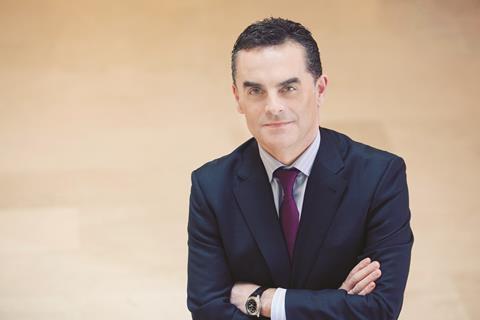The president of the Spanish risk management association, Juan Carlos López Porcel, wants it to become a pioneer in the delivery of knowledge

Finishing his closing speech at a conference in the harbour city of La Coruña in Northern Spain, Juan Carlos López Porcel is clearly pleased.
This is because his first speech as president of the Spanish risk management association, AGERS, in March, marks an important milestone in the association’s history. It has signed an agreement with Fundación INADE (INADE Atlantic Insurance Institute Foundation), establishing the start of a long-term partnership to develop risk management training. This will see AGERS and INADE jointly host educational workshops across the country.
“AGERS aims to become a pioneer in the delivery of knowledge”, López told StrategicRISK after the conference. “A resource that champions development and growth in risk management,” he continues.
This may sound like a tall order for an association run by a small team and that represents a fraction of the European risk management community, but López displays little doubt in achieving this aim. When he talks about his achievements during his 26 years at global steel manufacturing company ArcelorMittal, it becomes clear that he has the right skills to bring AGERS’s vision to fruition.
As ArcelorMittal’s director of risk and insurance for Southern Europe, López likes to advocate a holistic approach.
A robust enterprise-wide risk management strategy, dedication and hard work ensured risk-free transitions in a series of mergers and acquisitions, which helped form the steel-making brand that the world now knows as ArcelorMittal.
The first M&A he was involved in was when Spanish steel producer Aceralia was established in 1997 as a result of the restructuring of the Spanish steel company Corporación Siderúrgica Integral (formed from earlier mergers of the country’s steel producers, Empresa Nacional Siderúrgia Sociedad Anónima and Altos Hornos de Vizcaya).
Five years later, López saw the business through successful takeovers of Luxembourg-based steel producers ARBED and France-based Usinor to become Arcelor. In 2006, he was a member of the team who risk-managed the M&A that brought together Arcelor and Mittal Steel to become ArcelorMittal.
López thrives off managing a project from the beginning to the end and these M&As provided the ideal opportunity to do so. Being involved from start to finish “is important”, he says of an approach that may sound simple on paper but has evidently worked throughout his career.
“If you’re working in the commercial department, simply put, you are only selling. If you’re working in production, you focus solely on the process of manufacturing the products,” he says.
“But I wanted to be involved in all areas of the business and, as a risk manager, you have that opportunity.
“It is part of my job to check the entire process: how the company is manufacturing its products, how the products reach our customers, how we can improve customer satisfaction,
identifying where the revenue streams are, evaluating the balance sheet and income statements of the company, and finally, determining what we need to do to perfect the process – from beginning to end.”
López will adopt this conception-to-completion approach to ensure that AGERS provides the right support to its members.
Diving into challenges
Positioning itself to become a resource hub, AGERS aims to develop a community for the exchange of best practice, a network of peer support and a place to learn about new risk management techniques, both face to face in the form of workshops and virtually with the launch of AGERS 2.0, a new web-based forum for members. “I can sum up my vision for AGERS in one sentence” López says: “It is a meeting point to develop inspiration”.
AGERS’s resources will undoubtedly be valuable to the risk community, particularly as globalisation has expanded the manager’s portfolio of risks. As with many European countries, cyber risks, compliance and D&O liability are some of the major threats that Spanish risk professionals are currently juggling.
AGERS’s services have already brought about positive change, particularly in helping its members get to grips with the 2007 transposition of the European Liability Directive through its workshops.
The directive 2004/35/EC establishes a framework that defines liability in instances of environmental damage based on the ‘polluter pays principle’ but “the challenge was much wider than a simple transposition of the rules,” López says.
“The 2004 directive was transposed in Spain in 2007 with the issue of a local Royal Decree issued by the Spanish government.
“In that year, the government, while respecting the parameters of the directive for transposition, tried to strengthen the preventive aspects of the regulatory framework.
“Now, the Spanish Ministry of Agriculture, Food and Environment is in the process of modifying the Royal Decree of 2007 in order to guarantee an obligation among businesses to prevent and/or repair environmental damage, fomenting environmental risks analysis as an important tool in doing so.”
Spanish risk managers now face another regulatory challenge. In 2010, changes to the Spanish Criminal Code (SCC) widened the scope of criminal liability to businesses. The legislation now puts firms in the firing line, which was not the case before 2010. The code now stipulates that, with the exception of government-owned entities, companies can be held liable for corporate crimes committed by its directors or employees, meaning that the business and not merely its directors could face significant aggravated penalties.
Equally as worrying is the code’s inclusion of new criminal corporate offences and increased penalties. All these changes have raised concerns over the effect on D&O claims, which have been on the rise since the financial crisis.
“D&O is a big concern right now” López says. “We receive regular questions on our desk from top managers asking for advice on terms and conditions.
“The problem is there is a shortage of insurers that will cover employment-related risks. But risk professionals want to know more, they want to know how best to manage employment liability risks and they want to know how they can build their own defence strategies. As such, we are hosting workshops that focus on regulation and environmental liability. We are also looking at developing tailored services to help our members better understand D&O and professional liability risks – a good example of our dynamic approach and capacity to innovate.”
Much to look forward to
As a law graduate, scoping out the regulatory and compliance risks for businesses and drawing up the agenda for these workshops come naturally to López. However, he remains modest about his efforts in devising these seminars and in transforming the association into an essential resource hub. Instead, he puts all the hard work down to his team. “I cannot achieve anything without a team who strongly supports the aims of the
association,” he says.
“We are a small team but we are putting everything on the table to support our members. The board is also on board with what we are trying to achieve. But a lot of the credit has to go to our new executive general manager, Alicia Soler, who joined in January.”
AGERS members have much to look forward to in 2014. In the year that the association celebrates its 30th anniversary, its new president and his team are working to ensure that its goal to “become a pioneer in the delivery of knowledge” is realised through various training initiatives. Undoubtedly, this is a project that López will manage closely – “from beginning to end”. Kin Ly




















No comments yet